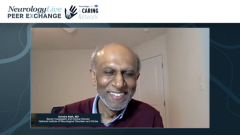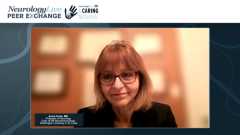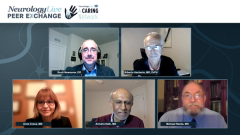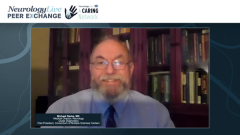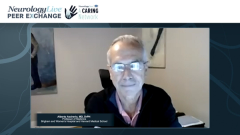
Debating the Possibility of Epstein-Barr Virus–Targeted Treatments for MS
Expert panelists review the viability of new treatments in development for multiple sclerosis.
Episodes in this series

Scott Newsome, DO: Do you feel like there may be some difference with progressive onset MS [multiple sclerosis] vs relapse onset? Alberto, you mentioned we have such highly effective drugs for relapsing-remitting MS. In my view, we have limited to none for progressive MS. If you were to put your money somewhere for therapeutics in the EBV [Epstein-Barr virus] world, if we feel that has some causal effect, where would you look? Would you look toward progressive MS and try to utilize treatments toward that phenotype? I don’t know the answer. What are your thoughts?
Alberto Ascherio, MD, DrPH: That’s a very good question. I agree that progressive MS is where we’d like to be able to intervene and change course. On the other hand, it could be too late, going back to the discussion we had before. Maybe the more you wait, the less the disease process becomes virus dependent. It’s a dilemma that doesn’t have a good answer. The only way to know the answer would be to try, with all the difficulties there are, either very early treatment or treatment in progressive patients and see what happens. We don’t have a good substitute for clinical experimental evidence, because we can discuss the mechanisms forever, but it’s enough to miss 1 link. The effect may be the opposite of what you expect. In the history of the treatment of MS, there have been some examples of that. There are things that we thought to be beneficial that we now know to be harmful because you missed a little piece of the very complex picture.
Scott Newsome, DO: Anne, Avi, and Mike, what about if you were to say, “Let’s bring this to a clinical trial,” and you could only go into 1 population? Alberto mentioned it’s very hard to do placebo-controlled trials, at least in relapsing MS, which I totally agree with. You could have a whole other conversation of ethics surrounding that. But in progressive MS, maybe that’s the opportunity for a lot of reasons. I don’t know what others think.
Avindra Nath, MD: Let me say something. The clinical trial will never work for herpesviruses. The reason is that none of these drugs get rid of the virus is that they only suppress viral replication. If you have active herpes viral replications, you’ll suppress it. You don’t get rid of the virus, even if you treat herpes and encephalitis. You never get rid of the herpesvirus. The herpesvirus is still there.
Michael Racke, MD: Don’t you think that I could make the argument that that’s how interferons worked? They got their name because they interfere with viral replication. With both alpha and beta interferon, everybody was saying, “It works because it modifies the immune system.” I could say, “No, what it’s doing is interfering with viral replication, and that’s how it’s mediating its effect.” Getting to Scott’s point, I’d say that it’s inhibiting the activation of virus that resulted in exacerbations. If you look at interferons, the treatment effect is much better against exacerbations and reducing MRI activity than it is against progression. I’d treat relapsing-remitting MS first and see if I could improve that as opposed to thinking that it had some effect to immediately inhibit progressive disease.
Avindra Nath, MD: When you have a relapse, do you have an increase in viral load for EBV?
Michael Racke, MD: I don’t know that.
Avindra Nath, MD: You don’t know.
Michael Racke, MD: Do you know that, Alberto?
Alberto Ascherio, MD, DrPH: No, there is—
Avindra Nath, MD: People have looked at it. We looked at it.
Michael Racke, MD: And there’s not.
Scott Newsome, DO: That was a setup question. Avi, I had a feeling.
Michael Racke, MD: But by that time—I go back to your point about epitope spreading. That may be that the mechanism of how EBV treatment would have to work is at the beginning to prevent the disease. Once I’ve had inflammation and had all the machination going for the pathogenesis of MS, I can now get rid of EBV, and the disease is going on its own.
Avindra Nath, MD: You can never get rid of EBV. That’s the thing. With all herpesviruses, once you’re infected with it, it doesn’t matter what antiviral agent you use. You’ve got it until the day you die. At least currently.
Anne Cross, MD: What about if you got rid of every single B cell?
Avindra Nath, MD: It doesn’t matter. The B cell is only 1 of the cells where EBV lies. EBV can infect a number of other cell types.
Michael Racke, MD: Are you arguing that the Atara Biotherapeutics drug wouldn’t work because you could never get rid of it?
Avindra Nath, MD: If you have a T-cell response against an infected cell, that’s a different story. If you have some antigen that’s still being expressed and you can get to the reservoirs, you theoretically could. But with an antiviral, you won’t. Theoretically, it’s possible that with a cytotoxic T-cell response, you could get rid of a latent reservoir. It’s not true latency because you still have antigens expressed during the latent period. It’s like a persistent infection. That’s possible.
Alberto Ascherio, MD, DrPH: The key question is what the mechanism is, because you mentioned viral reactivation. This is a question for you, Avi. How many B cells need to get a lytic reactivation of EBV in the brain to cause damage? Because my understanding of these low viruses from other examples is that you don’t need a massive virus. Even a tiny number of infected cells that are inducing lytic replication could cause a lot of damage. Some of this condition is difficult to find the virus in the brain. I don’t know what you think about that.
Avindra Nath, MD: It’s a theoretical possibility yet demonstrated in the virus. That has been very difficult. A lot of people have tried and never found it. When that Italian paper came out with EBV and the lymphoid follicles, you might remember that a lot of people look for it in the meninges. I had a postdoc who came from Jack Antel’s lab, and we spent 2 or 3 years with Richard Ambinder, an EBV expert at Johns Hopkins Medicine. We never found any virus in the brain. Jack Antel looked at it himself. A number of people looked at it. We couldn’t find EBV. We were very eager to find it.
Scott Newsome, DO: Avi, what caught my attention is that you said, “The reservoir.” I’m thinking about route of administration for therapeutics and where you may make a greater impact depending on the different subtype of MS. Meaning if you have progressive MS, we think about the blood-brain barrier not being as leaky as relapsing-remitting MS. Could there be a difference in the treatment effect with some of the vaccines that may be developed with where they’re given? With B-cell depletion, rituximab has been tried intravenously but also intrathecally. Maybe I’m just tired and not making a lot of sense, but I think about that. Because if we’re going try to help people with MS with different types of MS, there are some people in whom the route of administration is going to make a difference.
Avindra Nath, MD: The point that Mike was trying to make is that once the immune system is triggered, whatever vaccine or other treatment you’re going to do, it may not make a lot of difference if it’s an immune-mediated phenomenon that’s driving the pathophysiology. If you think it’s a viral-mediated phenomenon and the virus is key to the pathophysiology, then if you can suppress it, it will make a difference. But demonstrating that has been very difficult. It’s not from a lack of trying. People have been looking for EBV for decades in all kinds of stages of multiple sclerosis. That relationship has been very hard. Alberto is the first person who’s been able to demonstrate it serologically in this population. But in established multiple sclerosis, there’s a huge body of literature. It’s been very hard.
Michael Racke, MD: Yes, but what he demonstrated is that there was a response to the virus. It didn’t mean that the virus had to be in the brain. The other argument could be that it’s in a B cell in the bone marrow, for example. You’re looking in the brain, but nobody was looking at a bone marrow biopsy at that time.
Avindra Nath, MD: Yes.
Transcript Edited for Clarity
Newsletter
Keep your finger on the pulse of neurology—subscribe to NeurologyLive for expert interviews, new data, and breakthrough treatment updates.

